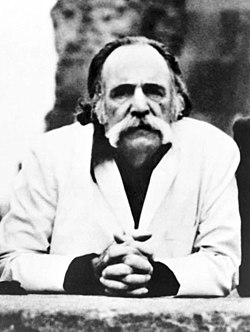William Saroyan Quote
What do you mean, what's the matter with him? Nothing's the matter with him, everything's the matter with him, the same as it is with everybody else. He's just fine. He gets overwhelmed now and then, and he doesn't know how to say what he feels or means, so he cries and runs off a little, trying to find out where to go, for God's sake. Where can you go?
William Saroyan
What do you mean, what's the matter with him? Nothing's the matter with him, everything's the matter with him, the same as it is with everybody else. He's just fine. He gets overwhelmed now and then, and he doesn't know how to say what he feels or means, so he cries and runs off a little, trying to find out where to go, for God's sake. Where can you go?
Related Quotes
About William Saroyan
William Saroyan (; August 31, 1908 – May 18, 1981) was an Armenian-American novelist, playwright, and short story writer. He was awarded the Pulitzer Prize for Drama in 1940, and in 1943 won the Academy Award for Best Story for the film The Human Comedy. When the studio rejected his original 240-page treatment, he turned it into a novel, The Human Comedy.
Saroyan wrote extensively about the Armenian immigrant life in California. Many of his stories and plays are set in his native Fresno. Some of his best-known works are The Time of Your Life, My Name Is Aram and My Heart's in the Highlands. His two collections of short stories from the 1930s, Inhale Exhale (1936) and The Daring Young Man on the Flying Trapeze (1941), are regarded as among his major achievements and essential documents of the cultural history of the period on the American West Coast.
He has been described in a Dickinson College news release as "one of the most prominent literary figures of the mid-20th century" and by Stephen Fry as "one of the most underrated writers of the [20th] century." Fry suggests that "he takes his place naturally alongside Hemingway, Steinbeck and Faulkner". Kurt Vonnegut has said that Saroyan was "the first and still the greatest of all the American minimalists.”
Saroyan wrote extensively about the Armenian immigrant life in California. Many of his stories and plays are set in his native Fresno. Some of his best-known works are The Time of Your Life, My Name Is Aram and My Heart's in the Highlands. His two collections of short stories from the 1930s, Inhale Exhale (1936) and The Daring Young Man on the Flying Trapeze (1941), are regarded as among his major achievements and essential documents of the cultural history of the period on the American West Coast.
He has been described in a Dickinson College news release as "one of the most prominent literary figures of the mid-20th century" and by Stephen Fry as "one of the most underrated writers of the [20th] century." Fry suggests that "he takes his place naturally alongside Hemingway, Steinbeck and Faulkner". Kurt Vonnegut has said that Saroyan was "the first and still the greatest of all the American minimalists.”
